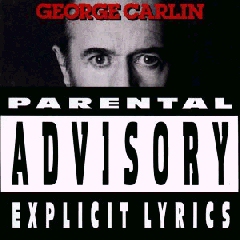|
The Supreme Court first confronted the issue of indecent (as opposed to obscene speech, which appeals to prurient interests) in the 1971 case of Cohen v California. Paul Cohen was convicted and sentenced to 30 days in jail for wearing in a courthouse corridor a jacket which, on its back, said "F - - - THE DRAFT" The Court reversed Cohen's conviction, finding his speech protected by the First Amendment. Writing for the Court, Justice Harlan noted that "one man's vulgarity is another man's lyric" and suggested that the First Amendment protects not just the intellectual content of speech, but the emotive content as well. In FCC v. Pacifica Foundation, the Court considered whether the Federal Communications Commission could, consistent with the First Amendment, punish a broadcaster who chose to play over the air at 2 o'clock on a weekday afternoon a twelve-minute "Filthy Words" monologue by George Carlin. In a narrow 5 to 4 decision, the Court upheld the FCC's authority to channel broadcasts containing indecent words to late-night broadcast hours when children are unlikely to comprise much of the audience. The Court based its holding on the lower level of First Amendment protection extended to broadcasting, the ability of broadcasts to zap listeners without warning in the privacy of their own living rooms, and the need to protect children from harmful speech. The dissenters, meanwhile, complained that the Court majority demonstrated "acute ethnocentric myopia." In Bethel
School
District No. 403 v Fraser (1986), the Court
upheld the right of a school district to punish a
high school student for delivering a sexually
suggestive nominating speech in a school
assembly. The Court noted that the speech
might reasonably be seen as interfering with the
school's attempt to teach civility, and that the
speech might have been caused discomfort to many
of the 14 and 15-year-old students who constituted
a "captive audience." The Bethel case
might be contrasted with Papish v Board of
Curators, in which the Supreme Court held
that a university's decision to expel a student
for distributing a paper on campus containing
indecent language and offensive cartoons violated
the First Amendment.
In FCC v Fox Television
(2009), the Court by a 5 to 4 vote upheld (as
against an administrative law challenge) an FCC rule
that fined broadcasters for even the fleeting,
one-time use of the "F"-word and the "S"-word.
Justice Scalia wrote for the Court that "The
commission could reasonably conclude that the
pervasiveness of foul language, and the coarsening
of public entertainment in other media such as
cable, justify more stringent regulation of
broadcast programs so as to give conscientious
parents a relatively safe haven for their children."
Scalia noted, however, that the Court's decision was
narrow and did not address the First Amendment
question raised by the FCC's order, sending the case
back to the court of appeals for further
consideration of that issue. Justice Thomas,
concurring, said he was "open" to a review of the
court's precedents that allowed a "deep intrusion
into the First Amendment rights of broadcaster."
Justice Ginsburg, writing for the four dissenters,
welcomed a constitutional challenge: "There is no
way to hide the long shadow the First Amendment
casts over what the commission has done. Today's
decision does nothing to diminish that shadow." In Iancu v Brunetti (2019), the Supreme Court reversed a Patent and Trademark Office decision to refuse registration of the trademark "FUCT". The PTO concluded the trademark ran afoul of the Lanham Act's prohibition on trademarks that "consist of or comprise immoral or scandalous matter." Writing for the Court, Justice Kagan concluded that the provision was unconstitutional in that it authorized "viewpoint discrimination" in violation of the First Amendment. Justice Kagan rejected the government's arguments that that a narrow interpretation of the Lanham Act (limiting its ability to reject registrations to vulgar and sexually explicit trademarks) might save the PTO's decision in this case.
|
 Cover of a George Carlin album. The
Cases Carlin Monologue at
Issue in Pacifica Student Speech at
Issue in Bethel Questions 2. What result if Cohen had been arrested for shouting these three words in the courthouse corridor? What result if he had been arrested for repeating these three words over and over on a street corner? 3. If you were arguing Cohen's case before the Supreme Court would you use "the F word" during your oral argument? Why or why not? 4. Does the Bethel case suggest that a student might be disciplined for wearing a jacket or a T-shirt emblazoned with the three words at issue in Cohen? What is the Court's rationale for allowing more regulation of speech within the context of a public school? 5. If Matthew Fraser had given his sexually suggestive nominating speech on a college campus, would he have been protected from discipline by the First Amendment? 6. The Supreme Court subsequently interpreted its decision in Pacifica as being about time channeling, suggesting that the First Amendment might have been violated had the FCC not allowed the Carlin monologue to be played at, say, 2am rather that at 2pm as it was. Is this the only plausible interpretation? 7. Given the Court's treatment of the privacy/sensibilities concern in Cohen and Pacifica, is there the suggestion that aural communications can be more offensive than visual? 8. Was it the words themselves, or the words in context, that was the key to the Court's conclusion in Pacifica that the Carlin broadcast could be the basis for FCC administrative punishment? What result if a broadcast station airs an interview in which the President uses a four-letter word? 9. Do you agree with the Pacifica plurality that Carlin's monologue lies at the "periphery" of First Amendment protection? 10. Analyze the constitutionality of the proposed Missouri ban (House Bill 297, in box to left) on certain forms of indecent speech.
Visual Indecency,
The FCC, and the First Amendment CBS sued the FCC in the Third Circuit Court
of Appeals. CBS asked the court to overturn
fines imposed after Janet Jackson's breast appeared
during the Superbowl. The network argued the
fine should be dismissed because the broadcast
itself was "neither explicit nor graphic." CBS also argued that
the FCC's "zero tolerance approach to indecency
enforcement" eliminated the "breathing space to
which CBS and all broadcasters are entitled to
exercise their First Amendment rights."
In July 2008, the Third Circuit overturned the FCC's action. Judge Scirica said the Federal Communications Commission had "arbitrarily and capriciously departed from its prior policy" that exempted fleeting broadcast material from actionable indecency violations. "Moreover, the FCC cannot impose liability on CBS for the acts of Janet Jackson and Justin Timberlake, independent contractors hired for the limited purposes of the Halftime Show ...." In May 2009, the Supreme Court reversed the decision and sent the case back to the Third Circuit for consideration in light of Fox v FCC. In October 2009, the FCC asked the Third Circuit to let it review the question of whether CBS acted "recklessly" in not using a tape delay during the halftime performance.
|

